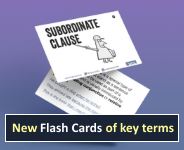Neoclassical compounds
In this activity, students analyse neoclassical compounds, which are compounds where often the word elements were taken from the classical languages (ancient Greek and Latin) and were combined in new ways in English (the element neo- comes from the Greek for ‘new’). Neoclassical compounds involve combining forms. They are meaningful elements drawn from Greek and Latin, which can combine with other elements to form words.
Activity 1
Ask students to think of as many words as possible which start with the combining form micro- meaning ‘small’.
Here are some examples they might think of. There are many others.
- microscope, microcar, microchip, microclimate, microcomputer, micro-organism, microphone, microsurgery, microprocessor, microwave
Students could use a dictionary to check other items or to find further examples.
Ask students if they know the meanings of the words they listed. They can use a dictionary to check if they are unsure.
Activity 2
Ask students if they know, or if they can guess, what the following words mean. Ask them to write down a definition for each word. What combining form do all these words share, and what do they think its meaning is?
- megastore, megastar, megafauna, megamouth (also called megamouth shark), megalith
Hint: -lith comes from the Greek word lithos meaning ‘stone’.
Answer: Their definitions should be similar in meaning to these, though of course the wordings can vary. (You will find slightly different definitions in different dictionaries.)
- megastore: a very large shop
- megastar: a person who is very famous and successful
- megafauna: very large animals
- megamouth: a type of shark with a very large mouth
- megalith: a very large stone put in place by prehistoric people
The combining form that all these words share is mega-, meaning ‘very large or important’.
Mega has also come to be used as an informal independent word: as an adjective meaning ‘very large’ or ‘excellent’, or an adverb meaning ‘extremely’. Can students think of likely sentence examples for these uses?
Welcome!

Englicious is totally free for everyone to use!
But in exchange, we ask that you register for an account on our site.
If you’ve already registered, you can log in straight away.
Since this is your first visit today, you can see this page by clicking the button below.
- Printer-friendly version
- Log in to view or leave comments

